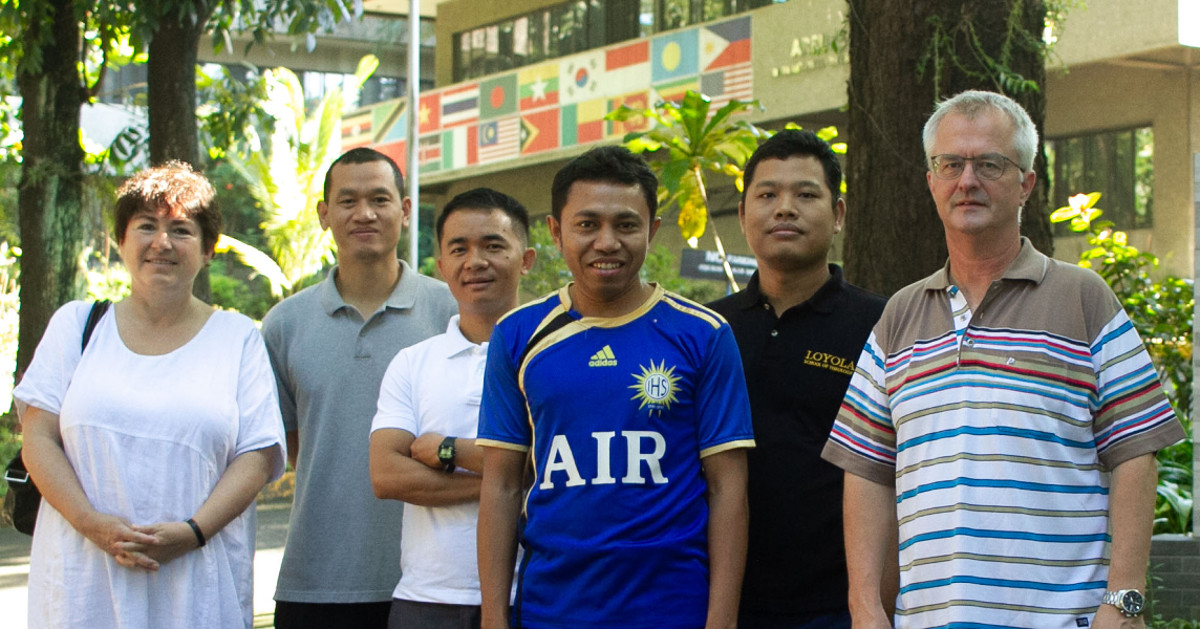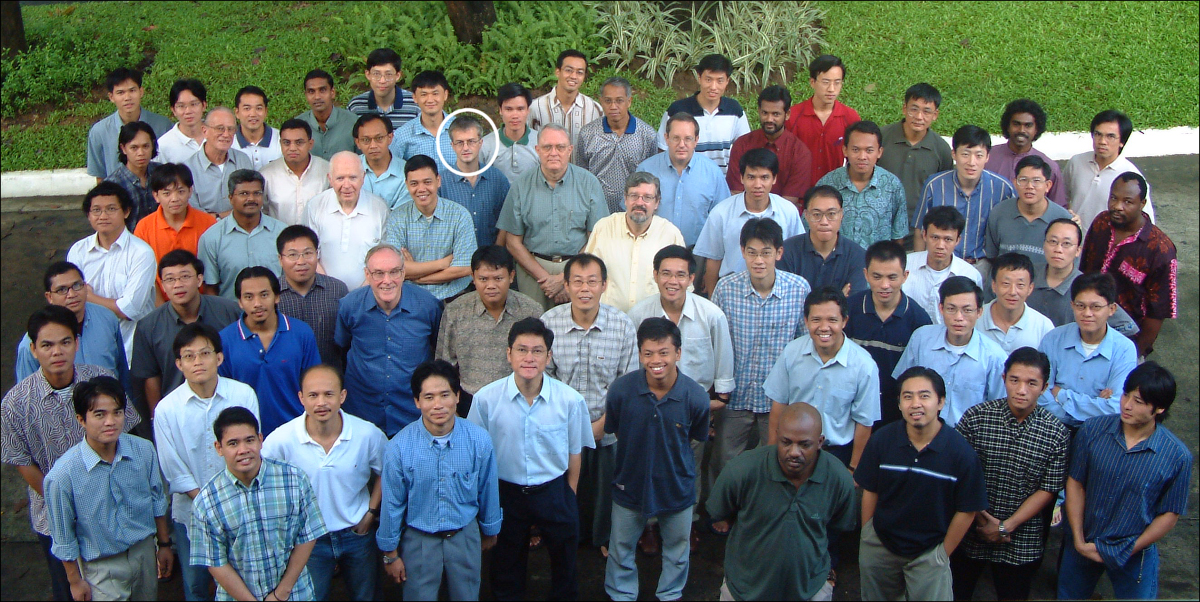
Dana Zumr (far left) and Fr Anton Kurmann SJ (far right) with scholastics from Myanmar and Timor-Leste supported by the Swiss Mission Office | Photo by Harry Setianto SJ
At the Arrupe International Residence (AIR) in Manila, diversity is not aspirational–it is a reality.
“We have a global family,” shared Fr Anton Kurmann SJ, a Swiss Jesuit who stayed at AIR from 2001 to 2004 while studying sociology at the Ateneo de Manila University. “This connectedness is one of the great contributions of AIR.”
Jesuits from across Asia Pacific, South Asia, Europe, North America and Africa come to AIR for the unique residential and formation experience it offers. Living there gives them a chance to engage in intercultural sharing on a daily basis. It is also an opportunity to build great networks for their future ministries.
“Globalisation brings us into contact with people of different nationalities and different religions, and we must be able to find ways to dialogue,” said Fr Kurmann during a recent trip to the Philippines as director of the Swiss Mission Office.
His time at AIR challenged him to adapt and be “more international” in his concept of the world. “One of my first struggles was to accept that in Arrupe people drink wine and beer with ice cubes,” he related in mild bewilderment and smiling. “In my culture, that’s a mortal sin, but I learnt to accept that it also works.”
Fr Kurmann strongly believes that Jesuits must be “interculturally competent”. Being only in their community, he says, is not an option for Jesuits. He cites AIR as a model in preparing Jesuits for international apostolates. The diversity of life at AIR complements the Asian Theology Programme at Loyola School of Theology (LST) to help prepare Jesuits–wherever they come from–for service within their own contexts of the universal mission of the Society.
“In Arrupe, you live with people from a variety of ethnicities and cultures, while LST gives you the tools to reflect on your experiences in your daily community life. If you are still more interested, Ateneo provides you with courses such as anthropology and sociology to make you reflect more on making positive interactions,” shared Fr Kurmann.
The Swiss Mission Office has been supporting the Jesuit Conference of Asia Pacific in the last decade or so through scholarships for scholastics staying at AIR. But the partnership goes all the way back at least 20 years–the Swiss Mission Office supported the construction of one of AIR’s buildings in the nineties.
“Supporting a Jesuit institution which does education and formation in an international setting like AIR makes a lot of sense because you fulfil one of the core functions of being a Jesuit, which is to be open to encountering people of other cultures and traditions,” said Dana Zumr, Swiss Mission Office CEO.
Zumr sees Jesuits as a bridge between communities. “Some people can do more in terms of playing an active part in bringing people together,” she said. “Jesuits, from the beginning, have done this through their approach of going to other communities, trying to adapt themselves to the culture and bringing it back to where they come from.”
She cites Myanmar as an example, a country very rich in culture with more than 100 distinct ethnic groups. “If the scholastics from Myanmar staying at AIR could help the Society go in that direction of intercultural dialogue, that would be something I would hope they would bring back to their country,” she said.
She also hopes to start long term relationships between the Swiss Mission Office and the scholastics they support, who eventually become priests and with pastoral ministries. “If they have ideas or projects, maybe Switzerland could support them. I think that would be great,” she said.
Fr Kurmann and Zumr believe that the future lies in Asia and subsidising the formation of the next generation of Jesuits is like having a glimpse of the future. “You have so many young people. They study theology but they are also connected to the other major religions, like Islam, Buddhism and even Hinduism. It’s a very interesting crystallisation. This is the core place to do all those connections,” said Zumr.
But Asia also faces many challenges, and the Swiss Mission Office also hopes to contribute to these areas.
“We want to support leadership, pedagogy and research, particularly on ecology. We want to contribute to research in the local context,” said Fr Kurmann. These areas are important to the Jesuit Conference of Asia Pacific.
“The conference has been a most reliable partner,” said Fr Kurmann. “It’s a constructive collaboration.”







